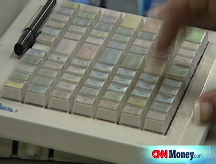Stagflation? Or just stagnation?
The inflation figures for July were ugly. But oil prices have fallen and the dollar has strengthened in August. Too bad a global slowdown is the reason.

NEW YORK (CNNMoney.com) -- Two key reports in the past week show that inflation was running high in July. But August is offering relief.
Oil has fallen to about $112 a barrel, nearly 25% from its mid-July record high. Gas prices have declined for 33 consecutive days. After flirting with $1,000 an ounce last month, the price of gold is now below $800.
And the dollar? It's gained more than 8% against the euro in the past few weeks.
Even one of the Federal Reserve's most vigilant inflation hawks, Dallas Federal Reserve president Richard Fisher, conceded as much on Tuesday.
"Data are the past. The question that the [Fed] must wrestle with is: What will occur on the inflation front going forward?" he said in a speech in Aspen, Colo.
Fisher talked about the somewhat paradoxical hope is that the inflation picture will improve because the economy is getting worse...at least in the near-term. High commodity prices will lead to lower demand, which, in turn, will eventually lead to lower prices of consumer goods and higher demand down the road.
However, comparing the economy to a neighbor's pet python named Julius Squeezer (I'm not making this up!), Fisher cautioned that the United States "might digest and dispatch the recent inflationary surge, or he might gag on it. It is too early to tell."
Translation: Even with growth slowing, some companies may still feel the need to keep raising prices because costs have surged so dramatically. And that would mean that inflation is far from being under control.
Fisher noted that many large companies, such as Unilever (UL), McDonald's (MCD, Fortune 500), Dow Chemical (DOW, Fortune 500) and American Airlines (AMR, Fortune 500), have all raised prices recently to offset higher costs.
So it's really just too soon to tell if this month's pullback in the price of oil and other commodities is merely temporary or the beginning of a prolonged decline in food and energy prices. The latter would obviously be a welcome boost to Main Street and Wall Street.
"It's tempting to say this was inflation's final hurrah but we need to see energy prices consistently come down," said Stuart Hoffman, chief economist of PNC Financial Services in Pittsburgh.
But there is a good case to be made that oil prices and other commodities will continue to fall. Simply put, high energy and good prices have finally caught up with Europe and Asia as well.
"The July inflation numbers were absolutely ugly but they probably reflect the peak of inflation. There is a lot of evidence showing substantially slower growth in the rest of the world," said Keith Hembre, chief economist with First American Funds in Minneapolis.
And as long as global growth remains sluggish, other central banks will be hard-pressed to raise interest rates anytime soon. And by not raising rates, that should hopefully lead to even more gains for the dollar.
But the biggest risk to this scenario would be that the Fed holds interest rates as low as they are currently or is even forced to lower them. If that happens, there's a chance that the recent slide in oil and spike in the dollar could reverse itself.
The Fed has given no indication that it is planning a rate hike in the near future, especially since fears about a government bailout of mortgage giants Fannie Mae (FNM, Fortune 500) and Freddie Mac (FRE, Fortune 500) persist and more concerns about the health of Lehman Brothers (LEH, Fortune 500) and other financial firms linger.
Still, Hembre believes that the Fed may not keep rates low for an extended period of time as it did following the 2001 recession. Some economists say the Fed is partly to blame for the housing bubble and resulting credit crunch because rates were so low for so long.
"If the Fed is too slow to raise rates then yeah, you could get a more meaningful inflation buildup. But that's probably not going to happen," Hembre said. ![]()




